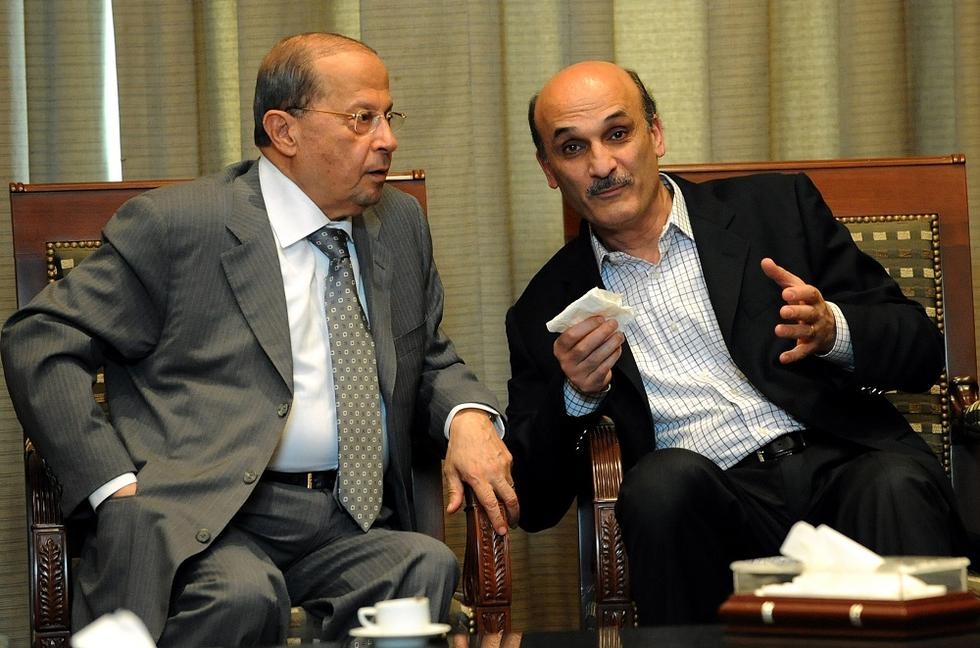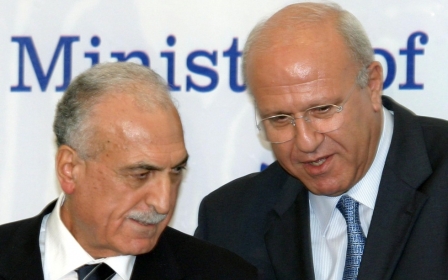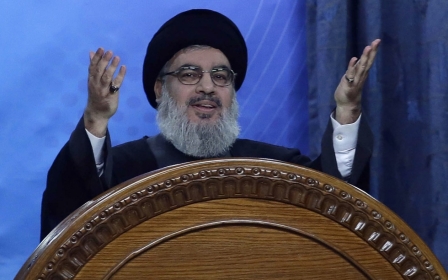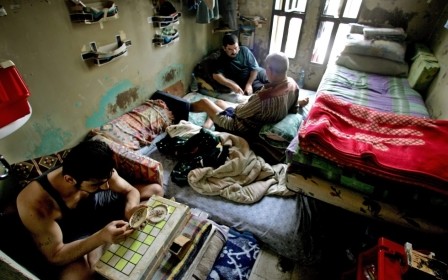Can Lebanon's presidential hopefuls end the power vacuum?

BEIRUT - Smiling for the sea of cameras, General Michel Aoun stood shoulder to shoulder with his longtime arch-nemesis Samir Geagea and pledged to thaw an almost 30-year rift between the two sides.
As the leaders of the two largest Christian political parties in Lebanon - the Free Patriotic Movement (FPM) and the Lebanese Forces (LF) respectively - the two men have been deeply divided and hold the balance of power in Lebanon.
Aoun’s FPM is allied to the Hezbollah-led 8 March camp, while Geagea belongs to the Sunni dominated 14 March group that is supported by the powerful and Saudi-backed Hariri family. Both men have been desperately vying to become president, with a deal seemingly impossible until now.
At Tuesday’s press conference, however, two veterans of the bloody and brutal civil war, announced a mutual declaration of intent. The statement, sketching out areas of agreement between the LF and FPM, has been hailed as historic by the press far more accustomed to writing about the age-old spat that emerged at the end of Lebanon’s 15-year civil war.
But only time will tell if their words spur action and end the now year-long presidential vacuum. The void has existed since last May when former President Michel Suleiman – who is not officially part of either camp - stepped down. Divisions over who should succeed him have been so deep that the Lebanese parliament has refused to meet to fill the presidency.
In a confessional parliamentary system, which distributes strict quotas of MPs by religious sect, the top posts in Lebanon's government are also divided by religion. Only Maronite Christians - who played a key role in negotiating Lebanon's independence in 1943 and have held a powerful, if not dominant, position in Lebanese society since - can be elected president. The speaker of parliament is always a Shia Muslim and his deputy a Greek Orthodox Christian, while the prime minister must be a Sunni Muslim.
After the initial deadlines to elect Sleiman's successor passed and battle lines were drawn over the presidency, political deadlock set in. The 68 MPs from the 8 March bloc, including Aoun's FPM, have repeatedly failed to attend voting sessions. As a result, the required quorum of having 86 of the 128 seats necessary for a vote has yet to be reached, and the presidential vacuum has endured.
While the split in Lebanon's parliament can be blamed on the rift over Hezbollah's growing regional and domestic assertiveness, the presidential election is a thornier issue. The issue is not merely a question of Hariri versus Hezbollah but of wider Christian political disenchantment and age old stubbornness to heal old wounds.
Over represented, under appreciated
"The issue is not the person, the issue today is the principle," Alain Aoun, FPM MP and nephew of General Michel Aoun told Middle East Eye. "Christians are struggling now to be fairly recognised and to be given their rights and actually fight for more relevance and a more effective role [politically]."
Despite making up about a third of the Lebanese population, Christians are allotted half of the parliamentary seats, although their overrepresentation has not quelled internal concerns. Many FPM supporters insist that the presidential election for them has become a fight for a Christian voice.
"We want to be represented as well," said Walid Khoury, another FPM MP. "Muslim politics is ignoring the Christians, but these Christians are the ones electing them. So this has to stop and this is the time to stop [it]."
"We are telling all the people that enough is enough and we want to make anew, to be represented."
This is only the second time since the Syrian occupation ended in 2005 that the parliament has been tasked with electing a president. In a country that has long been a pawn in the geopolitical chess games of the Middle East, many Christian politicians believe that they must seize this opportunity to take back control of Lebanese politics which has arguably been diminishing since before the civil war broke out in 1975.
While none of the Christian politicians MEE spoke to could raise any specific grievances stemming from their perceived lack of representation, the need for the president to reflect the will of Lebanon's Christians was paramount.
The presidential election "should be one decided by the whole country but only after respecting the Christian will," Aoun said. "You cannot fix the presidency without any thought for Christians."
"It's a Christian post, let the Christians in the first draw choose two," Khoury agreed, referencing four recent proposals by General Aoun's camp to change the way the country's leader is elected.
Foremost among these is a plan for a purely Christian vote selecting two candidates who then contest a national presidential election. This would require constitutional change unless parliament agreed to select whomever won the national referendum. However, while many believe that the proposal seems promising, in the current climate of legislative quagmire, any change to the system is unlikely.
Deceptive choice
It was only after an initial flurry of interest from a number of candidates that Aoun and Geagea emerged as firm frontrunners in the election. To Imad Salamey, associate professor of international affairs at the Lebanese American University, looking at the vote just through the prism of these two candidates is deceptive.
"I don't think either one of these - Geagea or Aoun- really believe they could win the presidency," he said.
"Pushing either to the front is only part of placing pressure on the other party to accept a consensus president that leans more to one side rather than the other."
Looking back historically, Salamey noted that Lebanese presidents are typically consensus candidates. Partisan presidents have only happened when one party dominates the political sphere and implants a president by force, a scenario that he views as unfeasible today.
Salamey isn't alone in questioning the chances of either candidate. For Fady Haber, a Christian MP for the 14 March bloc Kataeb party, "after a year, Aoun and Geagea have run aground. Neither has any chance of gaining the acceptance of the needed number of MPs. Thus the presidency is out of reach."
"But there is a possibility for another," Haber continued, "a strong candidate, like Sami Gemayel [who is expected to be the next Kataeb party leader]. We need a personality who can reunite the people. We need a president who can reunite Lebanon."
Strong-arm tactics
Lebanon has often looked to its military chiefs for such leadership. Before being elected president, Sleiman commanded the Lebanese Army. Jean Kawhawgi, the current army chief, has also been touted as a possible compromise candidate, although he lacks a natural political support base, something which might slim his chances. Riad Salameh, the Central Bank governor and Ziad Baroud, former minister of interior and municipalities face similar obstacles.
Regardless, a far more toxic debate currently surrounds Kahwagi's position. Along with the heads of the Internal Security Forces and the Gendarmerie, Kahwagi is due to retire this summer. Without the executive power of a president to oversee the appointment of their replacements, the positions have become key bargaining chips.
The 14 March bloc has been trying to extend their terms, but their replacement has become something of a crusade for General Aoun. Unless his son-in-law, current head of the Army Commandos Chamel Roukoz is considered for the role, his MPs will not engage with the election.
However, widespread opposition accusations of nepotism and self-interest are firmly rebuffed by Aoun's supporters. Alain Aoun made it clear to MEE that the whole party was behind the decision to contest an extension of the security chiefs' mandate. He cited the need to follow the rule of law as foremost among the party's priorities.
Khoury similarly refuted any hint of favouritism on the part of General Aoun, who also has another son-in-law serving as foreign minister, noting Roukoz' decades-long service in the army before he married General Aoun's daughter.
However, other allegations are also levied at the former army general.
Kataeb MP Haber was quick to conflate Aoun's candidacy with Iranian influence in Lebanon. "The Iranian name [behind General Aoun] doesn't improve the economic future of Lebanon, it doesn't push towards any improvement," he said. "The Iranian strategy pushes things only by force, by its dictatorship in the region."
Alain Aoun, on the other hand, lay the blame for the deadlock at the door on Riyadh’s door.
"[March 14] don't want to deliver anything here,” Aoun said. “They just wait for regional developments hoping that these will go in the favour of their regional allies."
Perhaps most worryingly for some of Lebanon's Christians is the growing irrelevance that Maronite politics seems to bear. "Major political decisions are driven by the regional Shiite Sunni struggle and in Lebanon where the fully-armed Shiite Hezbollah is the major political force in the country, all others are irrelevant," said Salamey.
Other, however, counter this by saying that Sunni politics is choking them out.
"From an economic perspective, it is the Sunni force, whose relations with the Arab World have placed it in closer political alignment with the West, which is marginalising the Christian political vote in Lebanon," Salamey concluded.
With dividing lines so deeply set, few expect much to come from the Geagea and Aoun rapprochement although as the talk turns to the next presidential vote,
Christian politicians continue to insist that a united leadership would be their best hope for representation.
New MEE newsletter: Jerusalem Dispatch
Sign up to get the latest insights and analysis on Israel-Palestine, alongside Turkey Unpacked and other MEE newsletters
Middle East Eye delivers independent and unrivalled coverage and analysis of the Middle East, North Africa and beyond. To learn more about republishing this content and the associated fees, please fill out this form. More about MEE can be found here.




